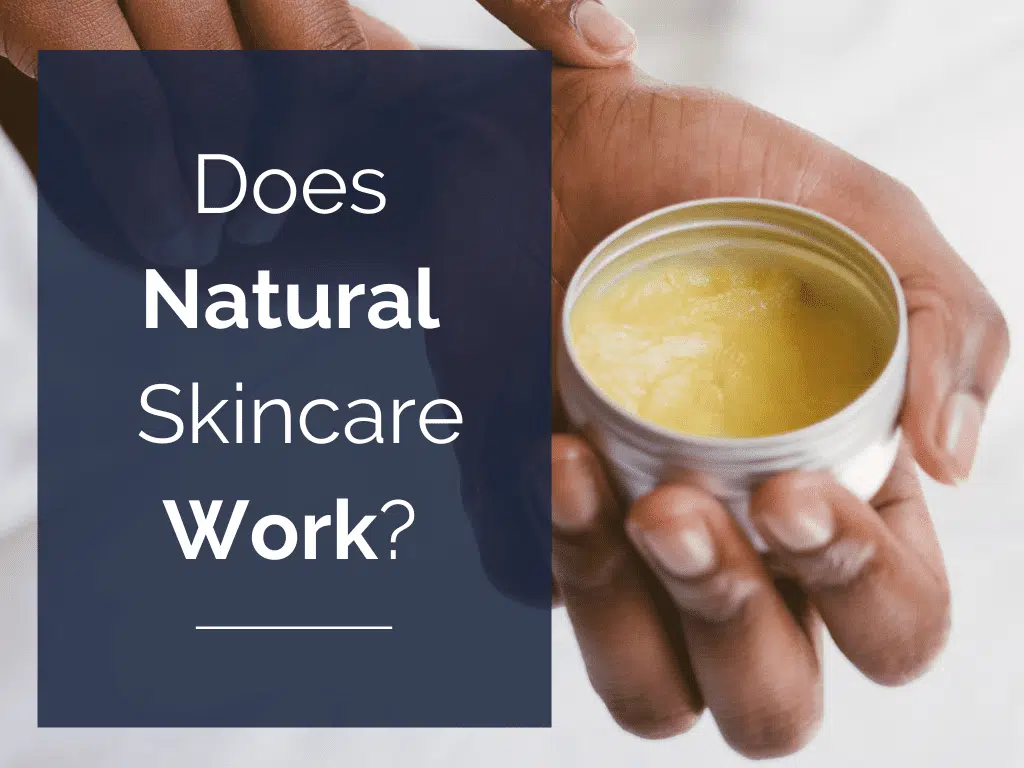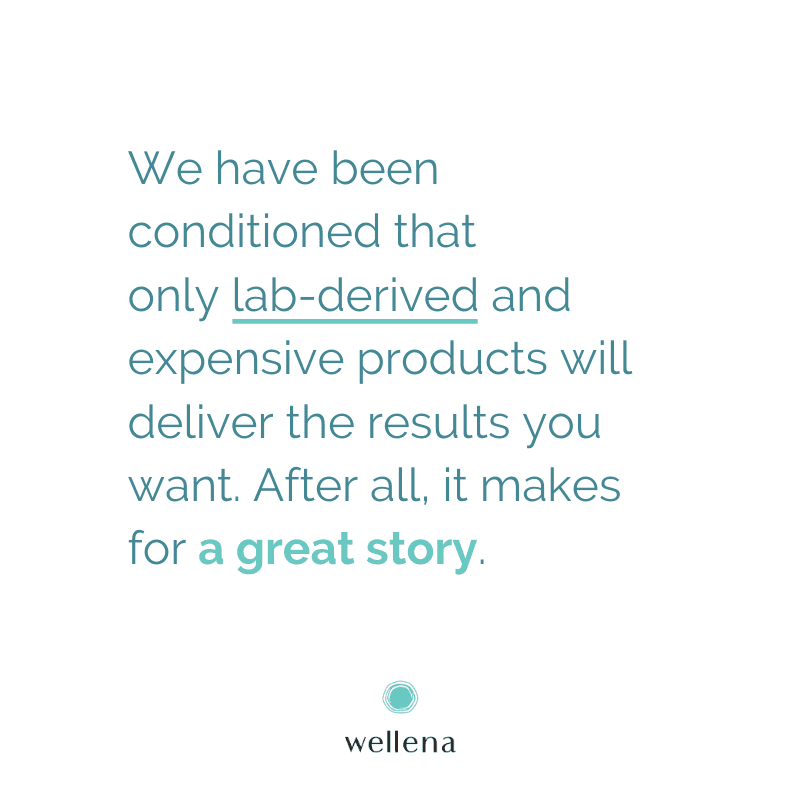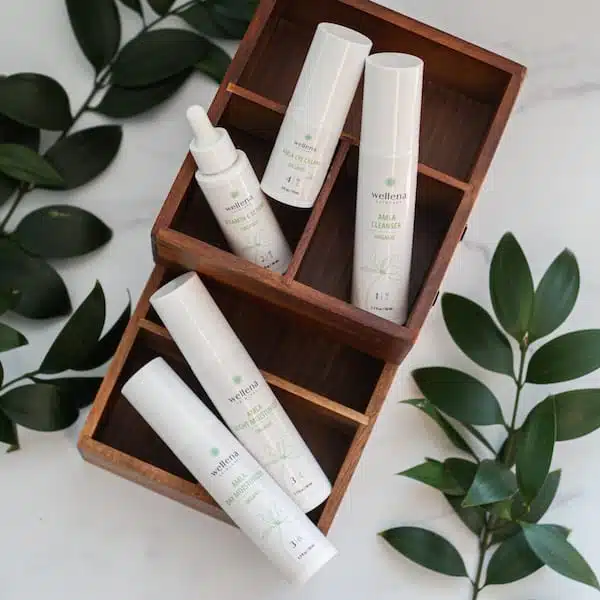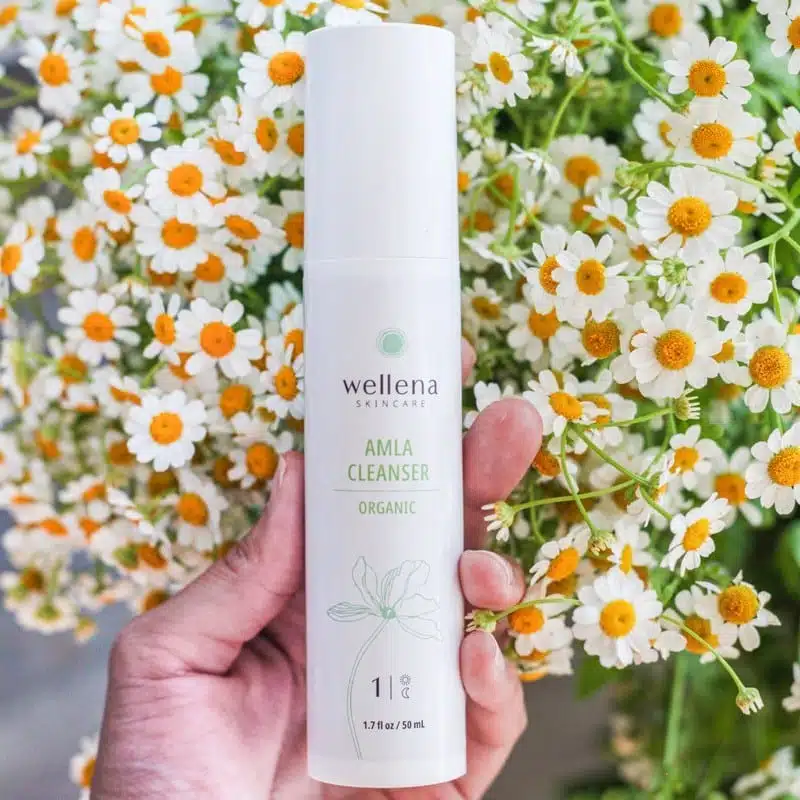What You Will Learn in This Article
- Do We Need Lab-derived Ingredients for Skincare to Work?
- A Look at Popular Lab-Derived Skincare Ingredients
- Our New, Natural Line: Wellena Skincare
This article was prompted by a conversation with a friend in her early 50’s, who stated that “all the natural skincare stuff doesn’t work, you need something ‘stronger’ for an aging skin.”
Maybe I’m naive, but I deeply disagree with this statement.
Partly, because I grew up in South East Asia, where many women rely on natural ingredients for wonderful skin. In spas throughout Indonesia, you’ll find lulur scrub, made from anti-inflammatory turmeric and ginger, and rice flour. This potent scrub is rubbed all over the body for exfoliated, soft skin.
In India, you’ll find women who daily moisturize their hair – called hair-oiling – and skin with coconut oil to show off healthy, thick hair and flawless skin.
People have used simple and wholesome ingredients for centuries and look amazing – for them, natural products certainly seem to be working.
Call me overly optimistic, but I believe that natural products work. Here is what may be an issue for many Western women: the quality of our skin also depends on our diet, hydration levels, hormones, stress, and toxicity levels. Since many of us Western women struggle with most of these issues, it’s no wonder that our skin suffers too, and we then look for “stronger” products that “actually work.”
Do We Need Lab-derived Ingredients for Skincare to Work?
There is a perception that natural products may not work as well, that they are too “weak” to improve, especially, aging skin. I hear the same argument amongst allopathic doctors – that herbs “don’t really work” and you need drugs to address a disease (which is true in many cases).
We have been conditioned that only lab-derived and expensive products will deliver the results you want. After all, it makes for a great story. It justifies the time, effort and investments that have been put into extracting, manipulating, deriving a complex constituent. Packaged with a great marketing story, it’s a winner.
Such beauty ingredients have recently gained much traction, namely peptides, growth factors, and antioxidants like resveratrol and retinol. These ingredients are purported to be key anti-aging constituents and are considered “must haves” in age-defying skin care.
Is it necessary to include those particular ingredients for a product to be effective? Not necessarily. Skincare research has come a long way since the discovery of those ingredients, and there are more options now than ever before. Many of these “new” ingredients have been used for centuries and are highly effective.
A Look at Popular Lab-Derived Skincare Ingredients
Peptides
Peptides are a popular ingredient for anti-aging skin care products, let’s face it: they are really expensive. In fact, many of these products sell for $100 an ounce. Some companies even claim peptides can replace cosmetic corrective or surgical procedures like botox or plastic surgery to turn back the clock. While peptides are certainly beneficial for skin repair and anti-aging effects, their miracle-working capabilities are overblown.
It’s important to know that there are different types of peptides, and some may be safer than others. Copper peptides are known to be very effective; however, some people get allergic reactions or dermatitis from them. They can also increase your tendency to get a sunburn. Copper is not something you want to get too high in your body, as it’s important to keep in balance with zinc. Copper toxicity is certainly possible.
Peptides can be a safe and beneficial ingredient in skin care products when not overused; however, you won’t see them in any product that is truly “organic.” The reason for this is that peptides come from proteins that are derived from animals. In skin care, organic ingredients must be plant-derived. That being the case, a skin care product with peptides cannot be certified USDA organic.
Resveratrol
Resveratrol is an antioxidant that is famous for its presence in red wine. It can also be derived from other botanicals, such as Japanese knotweed.
This ingredient is used by supplement and skin care industries for its antioxidant and anti-aging capabilities. Is it safe? For the most part, resveratrol appears to be a safe ingredient that may be found in organic products. Is it effective? It may work as a sunscreen, to some extent, and may help treat acne.
There is, however, some question about whether it could be estrogenic (promoting estrogen dominance) in some people. Resveratrol is a weak estrogen, so it’s really controversial in the same way flaxseed is. According to an article published by Harvard Medical School, it’s hard to say exactly how resveratrol will behave when it comes to its estrogenic effects. Sometimes high doses of resveratrol will boost estrogen activity and at other times, high doses of resveratrol actually block estrogen.
Retinol
Retinol (retinoic acid, retinoids) is more commonly known as vitamin A. It’s been a popular addition to many skin care routines to help reduce wrinkles. While it seems like adding vitamins to skin care would be a good thing, adding vitamin A to a topical cream still has side effects. Like many natural ingredients (think of lemon juice or citrus essential oils), retinol is photo-oxidative. That means it makes the skin more sensitive to sunlight. As a result, it can lead to sunburn or even skin cancer. Keeping this in mind, take caution when using products with retinol, and definitely don’t go out in the sun right after applying (this is why many manufacturers instruct to only apply it at night). This article by EWG, “The Problem with Vitamin A,” is a good read if you want to look into the topic more.
Another question that’s often asked: Do retinoids actually reduce the formation of wrinkles? To get the most benefit, you’ll need a prescription for a higher dose (0.3% rather than 0.1%). However, the higher strength, the more irritating and drying to the skin. Flaky skin isn’t what we’re going for.
It’s also important to note that how retinol is prepared, the quality of the retinol used, and how it’s stored will have an impact on how effective and safe it is. Usually, the higher quality the retinol topical, the higher the price tag.
Our New, Natural Line: Wellena Skincare
Natural skincare has made major advances in recent years. No longer do we need to stick to homemade oatmeal (and clog up the sink!) or avocado masks and plain witch hazel for toner. A combination of “bringing back skincare traditions” and new discoveries of plant extracts and delivery systems are happening every year, and natural products are giving conventional ones a run for their money. After all, what goes on your skin goes in your body, too.
I know how hard it is to find skincare products that are clean, effective, and most importantly, that you love to use. So, I set out to make my own line. Today, I’m proud to introduce to you Wellena Skincare.
We’re launching with 5 essential products:
- Amla Cleanser
- Vitamin C Serum
- Amla Eye Cream
- Amla Day Moisturizer
- Amla Night Moisturizer
As you might have noticed, the rock star of this line is amla, also known as Indian gooseberry. Extremely high in vitamin C, amla offers serious benefits to our skin, including anti-inflammatory effects, cellular repair, collagen synthesis, skin protection from free radicals, and deep moisturization. I talk more the benefits of taking vitamin C internally and externally here.
Some of the other great ingredients include:
- Aloe: Derived from the aloe vera plant, aloe is one of the most widely used plant compounds for soothing skin.It penetrates easily, leaving dry skin moisturized, and can even help calm skin inflammation.
- Soap nut: Have you heard of soap nuts before? They’re the dried shells from the soapberry nut, which contain a natural gentle soap called saponin. This nourishing soap is safe and effective on skin, and friendlier to the planet, too.
- Chamomile: Who hasn’t sipped on soothing chamomile tea to lull themselves into a restful sleep? It turns out, chamomile is just as effective at soothing and nourishing the skin. In our products, we use chamomile oil, which can relieve irritation and inflammation.
- Mango Seed Butter: This deeply moisturizing butter is derived from the natural fat in mango pits. As a rich emollient, mango seed butter nourishes the skin, leaving it supple, smooth, and firm. Mango seed butter is made up of a set of moisturizing fatty acids (including oleic, stearic, and linoleic) and nutrients like vitamin A, vitamin C, and vitamin E (hello, antioxidants).
- Shea Butter: You’ve likely used this hydrating emollient before. Shea butter is a fat that’s extracted from the nuts of the shea tree, most often found in West Africa. Like other plant butters, it contains moisturizing fatty acids (including oleic, stearic, and linoleic) that absorb readily into the skin. It also boasts high levels of vitamins A and E, meaning it’s an antioxidant powerhouse.
All our products are rooted in science. There’s no BS, just clean and honest ingredients that work. Our products are certified USDA Organic, and we use the cleanest, gentlest ingredients that nourish and repair the skin. These products are suitable for all skin types.
When you use our products, you can expect these benefits:
- Helps production of collagen
- Extremely high in vitamin C
- Overnight hydration
- Anti-inflammatory effects, cellular repair
- Soothing for the skin
- Emollient, deeply moisturizing
- Gluten-free
- Non-GMO
- No toxic preservatives
- No parabens
- No hydrogenated oils
- No artificial colors or fragrance
Want to Try Wellena Skincare? Get the Amla Cleanse + Nourish Kit.
If you’d like to try our natural product line for yourself (and support us in our new launch), the Amla Cleanse + Nourish Kit is a great option.
The Amla Cleanse + Nourish Kit makes your routine clean and easy, with certified organic ingredients known to gently cleanse and boost collagen levels. It includes full sizes of our:
- Amla Cleanser: Gentle and effective, our gel cleanser boasts high concentrations of antioxidant vitamin C, thanks to the superfruit amla. An organic soap derived from soap nuts provides gentle cleansing without stripping the skin of its natural oils. This cleanser is completely free of irritants, sulfates, or harsh chemicals.
- Amla Night Moisturizer: Loaded with rich hydration, this formulation increases skin elasticity, firmness, removes puffiness under the eye, and reduces fine lines and wrinkles. It’s an uber-nourishing nightly treatment.
- Amla Eye Cream: Formulated to increase skin elasticity and firmness, remove under-eye puffiness, reduce fine lines and wrinkles, moisturize, nourish and brighten the skin’s appearance.
We are also offering a 30 Day Money-Back Guarantee:
That’s right. You have 30 days from the purchase date to decide if our skincare line works for you. If you’re not happy, please reach out for a refund (on products only, not on shipping).
You can try our Wellena Cleanse + Nourish Kit here.
Resources
Baliga, M. S. et al. Amla (Emblica officinalis Gaertn), a wonder berry in the… : European Journal of Cancer Prevention. European Journal of Cancer Prevention. May 2011.
Israel, M.O. Effects of topical and dietary use of shea butter on animals. American Journal of Life Sciences. 2014.
Rahmani, A. H. et al. Aloe vera: Potential candidate in health management via modulation of biological activities. Pharmacognosy Review. July-December 2015.
Hajheydari, Z. et al. Effect of Aloe vera topical gel combined with tretinoin in treatment of mild and moderate acne vulgaris: a randomized, double-blind, prospective trial. Journal of Dermatological Treatment. 2014.
Lee, S.-H. Effect of German chamomile oil application on alleviating atopic dermatitis-like immune alterations in mice. Journal of Veterinary Science. March 2010.
Carroll, H. Boots launches ‘better than botox’ anti-wrinkle serum by No7. The Daily Mail. April 12, 2018.
Gorouhi, F. and Maibach, H. I. Role of topical peptides in preventing or treating aged skin. International Journal of Cosmetic Science. October, 2009.
The Derm Review team. Copper Peptide Serum. The Derm Review. September 28, 2018.
National Research Council (US) Committee on Copper in Drinking Water. Health Effects of Excess Copper – Copper in Drinking Water. National Academies Press (US). 2000.
U.S. Food & Drug Administration. Facts About the Current Good Manufacturing Practices (CGMPs). FDA.gov. June 25, 2018.
Examine team. Japanese Knotweed Supplement — Health Benefits, Dosage, Side Effects. Examine website. Accessed March 30, 2020.
Aziz, M. H. et al. Prevention of ultraviolet-B radiation damage by resveratrol in mouse skin is mediated via modulation in surviving. Photochemistry and Photobiology. January-February, 2005.
Fabbrocini, G. Resveratrol-containing gel for the treatment of acne vulgaris: a single-blind, vehicle-controlled, pilot study. American Journal of Clinical Dermatology. April 1, 2011.
Castillo, M. Can you get resveratrol’s anti-aging benefits by putting it on your skin? CBS News website. February 5, 2013.
Skerrett, P. J. Resveratrol… the Hype Continues. Harvard Health Publishing. February 3, 2012.
Harvard Healthbeat. Do retinoids really reduce wrinkles? Harvard Health Publishing. Accessed April 1, 2020.
Personal Care Products Council. INCI. Personal Care Products Council website. Accessed April 1, 2020.
Colameo, L. I Bathed In Red Wine and Here’s What Happened to My Skin. Allure. August 5, 2015.
Mei N, et al. Cytotoxicity and mutagenicity of retinol with ultraviolet A irradiation in mouse lymphoma cells. Toxicology In Vitro. 2010.




Thank you! This is very informative. I believe that natural ingredients can work better than chemical ones. But it’s a shame that they are more likely to cause allergies. I need to thoroughly test all organic care products before I use them, otherwise, I might get more harm than good.
Hi Tori,
Yes, taking those precautions are a good idea. Thank you!
Healthy Regards, HB Team
Thanks, I never heard about Wellena Skincare. Need to try.
Hello,
Thank you these products sound amazing!! I am so glad you mentioned photosensitivity and how those lab-derived products causes sun-sensitivity, as I suffer from severe sunburns and got skin conditions triggered by such ingredients sadly. Thus I switched to all natural. I love your products!! Though I was wondering, especially due to my case, won’t the high concentration of vitamin c in these products cause sun-sensitivity as well?